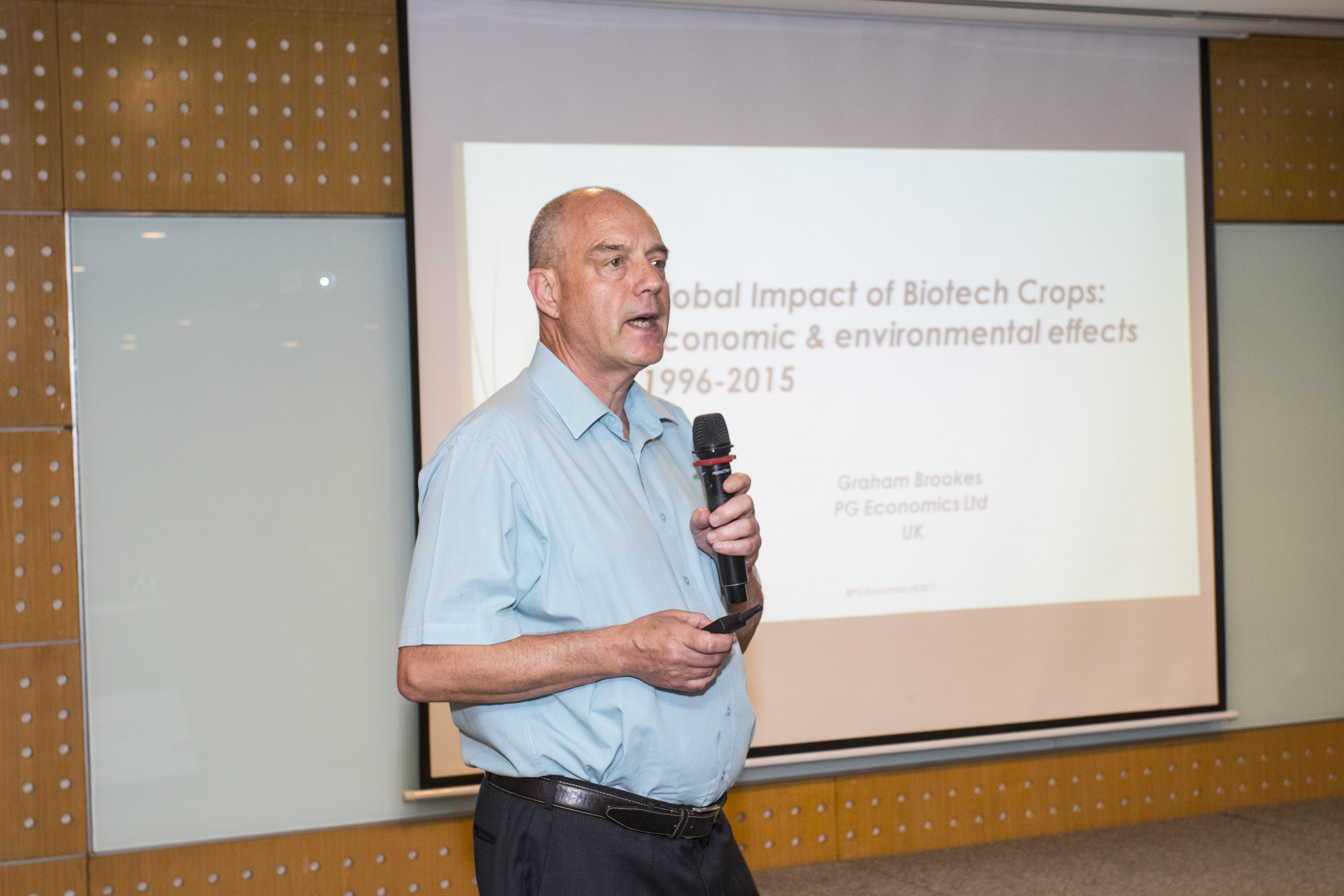GM corn: the future of global farming
 |
| Graham Brookes, director of PG Economics |
| RELATED CONTENTS: | |
| GM corn helps northern farmers raise yield | |
| Monsanto to commercialise new GM corn breeds | |
| Four GM corn traits receive food and feed safety certificates | |
Your report gives an in-depth analysis of the global impact of crop biotechnology between 1996 and 2015. Could you share some of the highlights?
After 20 years of widespread use, there is a considerable amount of consistent evidence in peer-reviewed literature on the impact of genetically modified (GM) crop technology. The new report shows that the innovative agricultural technology has contributed to preserving the earth’s natural resources while allowing farmers to grow more high-quality crops. It has helped alleviate poverty for 16.5 million, mostly smallholder farmers, in developing countries.
According to the report, crop biotechnology has been responsible for the production of an additional 574 million tonnes of food, feed, and fibre. Farmers who used biotech in the last 20-year period have increased gross global farm income by $167.7 billion. 49 per cent of these gains were booked by farmers in developed countries and 51 per cent by farmers in developing countries.
In terms of environmental impact, the technology has reduced pesticide spraying by 691 million kilogrammes since 1996, which is a reduction of 8.1 per cent. Meanwhile, it has cut CO2 emissions by 26.7 billion kilogrammes due to lower fuel use (less spraying and soil cultivation) and decreased the environment impact of herbicide and insecticide use.
The commercialisation of GM crops has taken place at a rapid rate in the past 20 years. How do you see this trend going forward?
Over the last two decades, where farmers have been given access to grow biotech crops, they have been consistently adopting the technology, contributing to a more sustainable food supply and a better local environment.
If you talk to farmers using the technology, they will list other reasons, including better crop quality as well as improved health and safety for farmers and consumers. Biotech crops would help them cut back on the use of pesticides, especially in developing countries where many apply pesticides with little or no use of protective clothing and equipment.
Moving forward, GM crop technology is gaining traction due to its significant positive impact on global gross farming income, which amounted to $15.5 billion in 2015. The technology is primarily used for main products, including corn, canola, cotton, and soybeans. The $15.5 billion figure is equal to adding 5.2 per cent to the value of global production of these four products.
Vietnam is a major regional and global production base of corn. What is the current status of biotech corn cultivation in the country?
Corn is an important cash crop in Vietnam which is grown continuously or in rotation with rice. The area under corn cultivation has reached 1.18 million hectares in the country, with the largest growing areas in the north midlands/mountain and highlands regions. The total plantation area is 12 per cent higher than 10 years ago, but the domestic demand is rising at an even faster rate, necessitating rising corn imports.
Currently, domestic production accounts for 40-50 per cent of the total supply, although the average yield has been increasing over the past years. The government has policies to encourage farmers to shift from low-productivity rice lands to corn or soybean.
In 2015, Vietnamese farmers started to commercially grow GM corn. The new-generation corn is weed- and insect-resistant, so it is expected to help farmers raise income and productivity with reduced environmental impact.
In 2016, 36,000 hectares of biotech corns were cultivated in Vietnam, which is probably 3 per cent of the national volume.
What are the potential impacts of the adoption of corn hybrid seeds with biotech traits in Vietnam?
The use of biotech corn will lead to both socioeconomic and environmental benefits. The cultivation of GM corn will reduce Asian Corn Bore pest damage and lead to better weed control. As a result, farmers will earn higher yields and better quality grain.
Biotech corn also lowers production costs even after paying a higher price for biotech seeds. There will be a small reduction in labour requirements on the farms, while higher farm household incomes will improve the quality of life and boost the rural economy.
The total economic gains to the rural economy could be $16.9 million per year in the worst scenario, if 20 per cent of the corn crop used was biotech corn.
Last but not least, GM corn helps farmers increase their output to meet the growing demand of the animal feed sector and improve their balance of payments. Equally important, Vietnam can gain several environmental benefits like lower insecticide use as well as switch to more environmentally friendly herbicides.
What the stars mean:
★ Poor ★ ★ Promising ★★★ Good ★★★★ Very good ★★★★★ Exceptional
Latest News
More News
- Aussie Beef Mate Club launched in Vietnam (February 23, 2023 | 10:32)
- Dragon Capital Vietnam helps research Ca Mau Mangroves and Pu Mat National Park (November 22, 2022 | 13:46)
- Vietnam promotes sustainable agriculture (July 26, 2022 | 10:30)
- Mekong Delta Resilient Business Network officially debuts (May 09, 2022 | 09:07)
- Vietnam approves development scheme for seafood processing in 2021-2030 (August 18, 2021 | 16:45)
- Vietnam and Norway strengthen cooperation in marine aquaculture industry (May 22, 2021 | 16:24)
- HCM City develops support industry (March 12, 2018 | 15:25)
- Dekalb Vietnam delivers spring warmth to Son La farmers (February 05, 2018 | 16:26)
- Monsanto’s answer to Vietnam’s burgeoning nutrition demand (November 07, 2017 | 16:22)
- Dekalb Vietnam: four years of fostering talent (October 29, 2017 | 21:34)
















 Mobile Version
Mobile Version